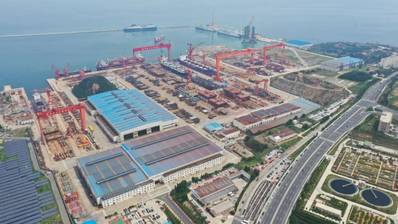Kongsberg Propulsion for Finnlines' RoPax Duo
Norway's Kongsberg Maritime has signed a deal with China Merchants Jinling Shipyard (Weihai) to deliver a propulsion and maneuvering system for two 230 meters roll-on, roll-off passenger (RoPax) vessels being built for Baltic Sea-focused operator Finnlines.
The two Finnlines' flagship Superstar RoPax vessels, vessels, equipped with sustainable technologies for green operation, will each have a capacity for 1,212 passengers. Under construction in China, the vessels are expected to be delivered for deployment in the Baltic Sea by 2023.
For Kongsberg Maritime, the contract is worth more than 12 million euros.
The ships will be built to the Swedish/Finnish ice-class (1A Super), with a twin shaft line propulsion system powered by four main engines.
Kongsberg Maritime has proposed a system whereby the ships will be able to run two efficiency/speed profiles: 16 knots with two engines running, or 19 knots with four engines running.
"This capability is enabled via an innovative two-speed gearbox solution, delivering a propulsion efficiency increase of about 3% compared with a single-speed gearbox," Kongsberg Maritime has explained.
Yaling Liu, VP Sales and Marketing for Kongsberg Maritime in Greater China, said: “We understand the conditions in which the customer’s vessels will operate and have developed strategies to improve energy efficiency, thereby saving fuel and reducing emissions. Our well-proven Ice Class 1A propulsion package will allow the vessels to work effectively in Arctic conditions, dealing with floating ice and extreme cold.”
Per Kongsberg, efficiency is further boosted through the use of the company's Controllable Pitch Propellers (CPPs).
"With the propeller and rudder integrated into a single system, hydrodynamic performance is optimized, thrust is increased and drag is reduced, with a consequent reduction in emissions. Combined with a ‘twisted’ rudder design that further improves maneuverability, twin-screw vessels can be expected to achieve efficiency gains of up to 6%," Kongsberg explained.
In a separate statement on Thursday, Finnlines said it was monitoring the situation with the pandemic and was taking care of the health and safety of its employees, customers, subcontractors, and business partners "while ensuring that all operations continue as smoothly as possible."
The company said that its cargo-passenger ships operated normally despite the coronavirus outbreak.
However, it warned the guidelines and instructions set by national and international authorities may affect the passenger traffic, advising passengers to make sure they are able to enter the country they are traveling to before setting off.














